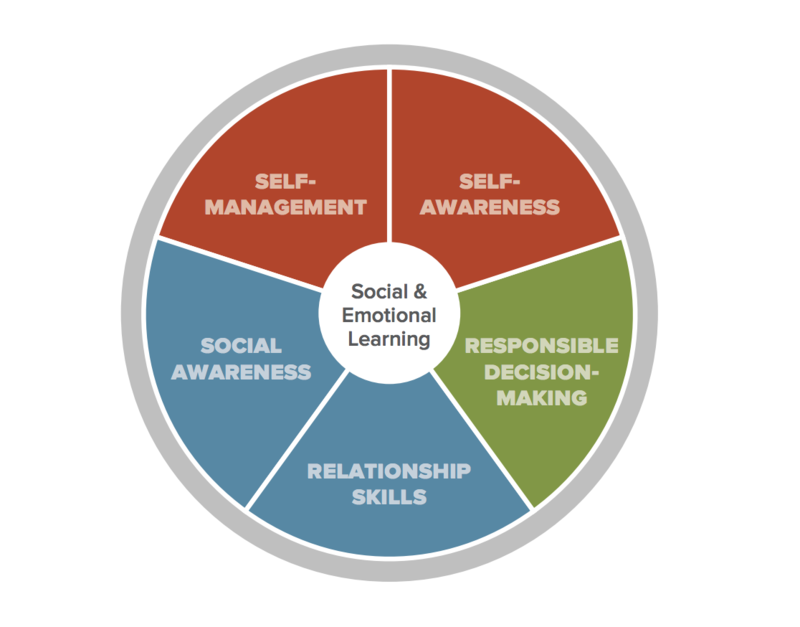Learning, Knowledge and Human Development MOOC’s Updates
Social Emotional Learning Throughout School and Work
How do social and emotional conditions affect learning?
According to Daniel Goleman’s research and published Emotional Intelligence: Why It Can Matter More Than IQ shows that social emotional learning does help children’s academic growth while inhibiting mental disorders. Goleman took it further to describe 5 SEL skills, namely, emotional self-awareness skills; self-regulation; motivation; empathy and social skills. These skills help children develop a more respond approach rather than react approach.
When looking at classroom settings with SEL, they focus on principles of kindness, respect and empathy. SEL in turn affects learning by delivering a kinder environment that is optimal for brain development. It helps create neural circuitry resulting in a child that has less disruptive emotional impulses and higher self-confidence. This will cause better memory and positive behaviours. The learning process becomes more engaging and enjoyable.
https://www.yourtherapysource.com/blog1/2019/12/12/how-does-social-and-emotional-development-affect-learning/#:~:text=embody%20those%20qualities.-,How%20does%20social%20and%20emotional%20development%20affect%20learning%3F,circuitry%2C%20particularly%20the%20executive%20functions.
In the past it was widely understood that SEL was automatically learnt by humans. However, recent studies show that some people fail to read other people’s emotions and their own emotions. It is now very important to teach students this skill to understand their emotions and the emotions of others. The introduction of SEL has drastically changed how children learn and develop their emotional intelligence and results in much better adults.
https://www.youtube.com/watch?v=t-14ZpXPIyo&feature=youtu.be
In any setting, whether at school, university, the workplace or personal life. Using SEL can dramatically change how we perceive learning. The management of social life and emotions help children develop better decision making skills. A paper written by Alzahrani et al. shows that the relationship with the educator and peers plays a big role in the development and interest of learning. Whether positive or negative.
Social and emotional skills are seen to be tied with the ability to connect with people using their communication skills. The skills that children and adults learn in community are essential skills to develop their social and emotional competence which leads to a higher success in academics and a positive perception of learning in general. These good outcomes at school, ease of learning, well-being and managing good behaviours are developed through SEL.
Alzahrani, Mona & Alharbi, Manal & Alodwani, Amani. (2019). The Effect of Social-Emotional Competence on Children Academic Achievement and Behavioral Development. International Education Studies. 12. 141. 10.5539/ies.v12n12p141.
https://www.researchgate.net/publication/337640477_The_Effect_of_Social-Emotional_Competence_on_Children_Academic_Achievement_and_Behavioral_Development
Another great depiction of how emotions are managed is through the movie “Inside Out”. This movie shows how we manage our positive and negative emotions as we grow up. During the movie we are introduced to core memories which are names as such because they are strongly tied to some or the other emotion. Our emotions drive our attention and perception of our surroundings. In the movie, our emotions work together to create long lasting memories that end up in our personality island.
https://www.edutopia.org/blog/emotions-affect-learning-behavior-relationships-lori-desautels
SEL can be fostered in many other environments especially in community. After-school activities can support such activities that enhance social and emotional skills. SEL can be added from early childhood all the way and needs to be supported in the community to foster good behaviour. This results in individuals who are self-aware of their emotions and the emotions of their surroundings.
Gullotta, T.P. (2015). "After-School Programming and SEL." In J.A. Durlak, C.E. Domitrovich, R.P. Weissberg, & T.P. Gullotta (Eds.), Handbook of Social and Emotional Learning. New York: Guilford Press.
https://www.edutopia.org/blog/why-sel-essential-for-students-weissberg-durlak-domitrovich-gullotta
Take an area of socio-behavioral learning interest or concern to you. What does the evidence tell? What are the main concepts we need to interpret the evidence?
An interesting setting for SEL is at the workplace. Employers are constantly in search of applicants with skills such as “emotional intelligence”, “problem-solving”, “people skills” etc. All of which are thought to be unteachable but SEL education begs to differ. By teaching these skills mentioned. The search for these skills will be instilled in many as well as the eagerness to learn more if the environment allows.
Another area where SEL is needed to be implemented in the workplace. As humans we are constantly learning even after we assume we are done with our “schooling” stage. We continue to learn and develop. Some workplaces have adopted a way to integrate SEL on their day to day and others have a more rigid workplace. If we look at all the evidence provided in the various studies of SEL mentioned above we can clearly see that no matter what stage you are in you need a cultivating environment to learn and grow.
Learning is a continuous activity. Learning emotions and how to handle them and how to detect them has proven to be a very important skill. In early childhood till adulthood. Therefore we should integrate SEL in all stages of brain development to cultivate the society and result in better outcomes at school, at jobseeking and retaining jobs.
https://assets.ctfassets.net/98bcvzcrxclo/4tdo0pUENWgSYy2MKYQCe0/f7203d5566545b1efeaaa8a2fd8eb0e8/sel-employability-briefing-paper.pdf
References:
Alzahrani, Mona & Alharbi, Manal & Alodwani, Amani. (2019). The Effect of Social-Emotional Competence on Children Academic Achievement and Behavioral Development. International Education Studies. 12. 141. 10.5539/ies.v12n12p141.
https://www.yourtherapysource.com/blog1/2019/12/12/how-does-social-and-emotional-development-affect-learning/#:~:text=embody%20those%20qualities.-,How%20does%20social%20and%20emotional%20development%20affect%20learning%3F,circuitry%2C%20particularly%20the%20executive%20functions.
https://www.youtube.com/watch?v=t-14ZpXPIyo&feature=youtu.be
https://www.researchgate.net/publication/337640477_The_Effect_of_Social-Emotional_Competence_on_Children_Academic_Achievement_and_Behavioral_Development
https://www.edutopia.org/blog/emotions-affect-learning-behavior-relationships-lori-desautels
https://www.edutopia.org/blog/why-sel-essential-for-students-weissberg-durlak-domitrovich-gullotta
Gullotta, T.P. (2015). "After-School Programming and SEL." In J.A. Durlak, C.E. Domitrovich, R.P. Weissberg, & T.P. Gullotta (Eds.), Handbook of Social and Emotional Learning. New York: Guilford Press.
https://assets.ctfassets.net/98bcvzcrxclo/4tdo0pUENWgSYy2MKYQCe0/f7203d5566545b1efeaaa8a2fd8eb0e8/sel-employability-briefing-paper.pdf
https://www.cfchildren.org/what-is-social-emotional-learning/work/
https://apertureed.com/employers-want-sel-critical-career-success/


